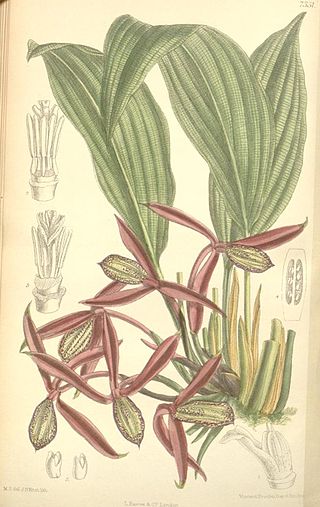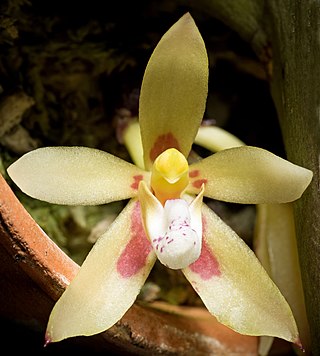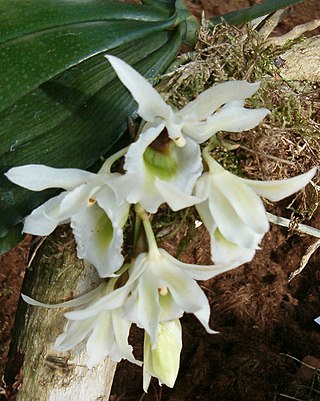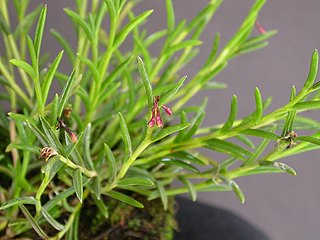
Orchidantha is a genus of flowering plants. In the APG III system, it is placed in the family Lowiaceae, as the sole genus. It includes the plants in the formerly recognised genera Lowia and Protamomum.

Oncidium, abbreviated as Onc. in the horticultural trade, is a genus that, as of December 2023, contains about 340 species of orchids from the subtribe Oncidiinae of the orchid family Orchidaceae. It is distributed across tropical and subtropical America from Mexico, Central America and the West Indies to northern Argentina, with one species (O. ensatum) extending into Florida. Common names for plants in this genus include dancing-lady orchid and golden shower orchid.

Lepanthes is a large genus of orchids with about 800–1000 species, distributed in the Antilles and from Mexico through Bolivia. The genus is abbreviated in horticultural trade as Lths. Almost all the species in the genus are small and live in cloud forests. Babyboot orchid is a common name.

Drakaea is a genus of 10 species in the plant family Orchidaceae commonly known as hammer orchids. All ten species only occur in the south-west of Western Australia. Hammer orchids are characterised by an insectoid labellum that is attached to a narrow, hinged stem, which holds it aloft. The stem can only hinge backwards, where the broadly winged column carries the pollen and stigma. Each species of hammer orchid is pollinated by a specific species of thynnid wasp. Thynnid wasps are unusual in that the female is flightless and mating occurs when the male carries a female away to a source of food. The labellum of the orchid resembles a female thynnid wasp in shape, colour and scent. Insect pollination involving sexual attraction is common in orchids but the interaction between the male thynnid wasp and the hammer orchid is unique in that it involves the insect trying to fly away with a part of the flower.
Dilochiopsis is a genus of orchids. It was previously considered as a synonym of the genus Eria, but eventually it has become an accepted name. At present, there is only one known species, Dilochiopsis scortechinii, endemic to peninsular Malaysia.

Psychopsis is a genus of four known species of orchids native to northern South America, Central America and Trinidad. The genus name is abbreviated Pyp. in the horticultural trade.
Bulbophyllum macphersonii, commonly known as eyelash orchids, is a species of epiphytic or lithophytic orchid that is endemic to Queensland. It has tiny, crowded, slightly flattened, dark green pseudobulbs, a single thick, fleshy leaf and a single dark red to purplish red flower with a narrow labellum. It grows on trees and rocks in sheltered places.

Brachypeza, commonly known as sage orchids, is a genus of flowering plants from the orchid family, Orchidaceae. Orchids in this genus have short stems with fleshy leaves and arching flowering stems with short-lived flowers. The sepals and petals are similar in size and shape and the labellum is pouch-like and suspended at the base of the flower. Sage orchids occur in tropical areas from Indochina to New Guinea.

Calyptrochilum is a genus of flowering plants from the orchid family Orchidaceae native to tropical Africa, with one species extending into Brazil.

Cleisocentron is a genus of flowering plants from the orchid family, Orchidaceae. It has a disjunct distribution, known from the Himalayas, Vietnam, China and Borneo.
Dinklageella is a genus of flowering plants from the orchid family, Orchidaceae. It contains 4 known species, all native to tropical West Africa.
- Dinklageella libericaMansf.
- Dinklageella minorSummerh.
- Dinklageella scandensStévart & P.J.Cribb
- Dinklageella villiersiiSzlach. & Olszewski

Eurychone is a genus of flowering plants from the orchid family, Orchidaceae. The genus was founded in 1918 by Rudolf Schlechter. It contains two known species, both native to tropical Africa.

Evotella is a genus of flowering plants from the orchid family, Orchidaceae. It contains only one known species, Evotella rubiginosa, endemic to South Africa.

Hagsatera is a genus of flowering plants from the orchid family, Orchidaceae.
Hederorkis is a genus of flowering plants from the orchid family, Orchidaceae. It contains two known species, both native to islands in the Indian Ocean.

Jacquiniella is a genus of flowering plants from the orchid family, Orchidaceae. It is native to Mexico, Central America, the West Indies, and South America.

Neotinea is a genus of flowering plants from the orchid family, Orchidaceae. It is native to much of Europe, the Mediterranean region, and the islands of the eastern Atlantic, from the Canaries, Madeira and Ireland east to Iran and Western Siberia.

Paradisanthus is a genus of flowering plants from the orchid family, Orchidaceae. It contains 4 known species, all endemic to Brazil.
- Paradisanthus bahiensisRchb.f.
- Paradisanthus micranthus(Barb.Rodr.) Schltr.
- Paradisanthus moseniiRchb.f.
- Paradisanthus neglectusSchltr.

Sarcanthopsis, commonly known as goliath orchids, is a genus of six species of flowering plants from the orchid family, Orchidaceae. Plants in this genus are large epiphytes or lithophytes with long, thick, leathery stems, large, crowded leathery leaves and many yellowish flowers on a branched flowering stem. Orchids in this genus occur in New Guinea and islands of the south-west Pacific.

Limodorum is a genus of myco-heterotrophic orchids. All species are temperate terrestrial plants and occur across much of Europe, North-West Africa, the Mediterranean Islands, and as far east as Iran. Plants have evolved away from photosynthesis and as a result their leaves are reduced to scales. There is still chlorophyll present but the plants are believed to be solely dependent on their fungal partner for nutrients. They spend most of their life underground as a short stem with fleshy roots, the unbranched inflorescence can appear in April to June if conditions are favourable.
















